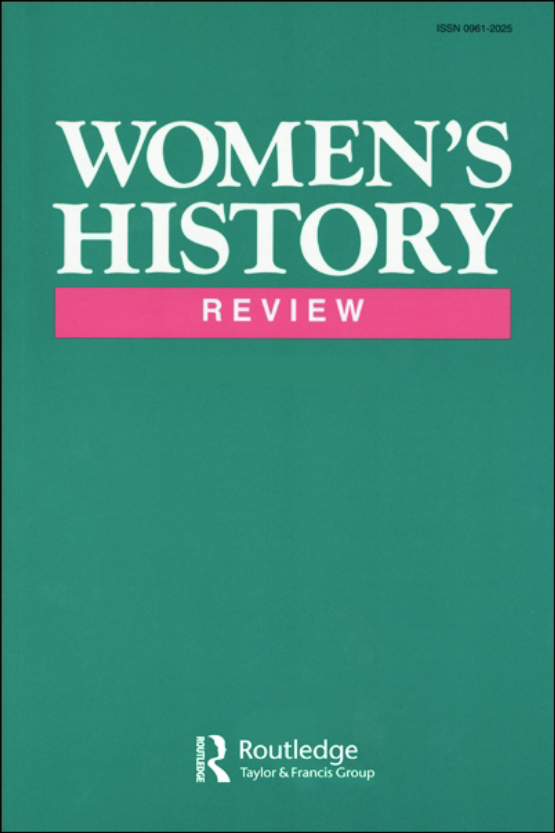Submit a Manuscript to the Journal
Women's History Review
For a Special Issue on
Scholarly Lives: Histories of Academic Women
Abstract deadline
Manuscript deadline

Scholarly Lives: Histories of Academic Women
Asymmetrical relationships of power have historically defined and indeed continue to define academic women’s scholarly lives. The historiography of the academy reflects and contributes to this power imbalance, privileging the dominant presence of men and their voices. This special issue seeks to redress this imbalance by ‘speaking the close detail of the fabric’ (1) of academic women’s scholarly lives, revealing the risky, contested and often hidden spaces in which the first generations of academic women negotiated and crafted a scholarly life. Taking a longue durée approach, it seeks to trace the complex contours of the scholarly lives of a range of academic women internationally whose lives straddled the late 19th and mid-20th centuries, providing key insights into the shifting contours of acceptance and resistance towards academic women across time, region and discipline. The early academic women were firsts, trailblazers and transgressors, and their agency, resolve and energy fundamentally shifted the ‘center of gravity’ of the academy converting ‘knowledge to power.’ (2) Despite and in many ways because of this activism, this agitation, they paradoxically lived scholarly lives as both insiders and interlopers, exercising ambivalent status as both role models and gender transgressors, operating at once on the core and on the periphery of the academy. (3) As perceived insiders, they played a pivotal role in managing the shift at the turn of the twentieth century towards coeducation, their appointments to key roles ensuring the female student body was appropriately supervised and supported. As interlopers, however, they were cloistered in departments and disciplines peripheral to the core business of university activity, thus ensuring limited disruption to the androcentric centre and mission of the university. Yet, as financially independent, public-facing and scholarly women, many of whom chose not to marry, they collided with the social construction of womanhood, representing a threat to the wife/mother dualism. Pursuing scholarly lives in predominantly female spaces, they built networks and fostered communities of like-minded women, developing strong emotional and intellectual bonds which over time threatened the patriarchal structure and even the culture of the university.
In tracing the ‘intractable contradictions’ (4) of the scholarly lives of academic women, we invite contributions to this special issue which:
- Examine the paradoxes inherent in academic women’s insider/interloper status;
- Trace the dynamic interplay between individual agency and institutional constraints;
- Explore how academic women negotiated and understood their own scholarly identities
across diverse social, political and cultural settings; - Focus on key inflection points and moments of transition in relation to the lives of
academic women.
References
(1) Stanley, Liz. (1992) The Auto/biographical ‘I’: The Theory and Practice of Feminist
Auto/biography. Manchester: Manchester University Press, p. 160.
(2) Rich, Adrienne (1979) On Lies, Secrets and Silence: Selected Prose, 1966-1978. London &
New York: W.W. Norton, p. 128.
(3) Blount, Jackie (2000) ‘Spinsters, Bachelors, and Other Gender Transgressors in School
Employment, 1850-1990,’ Review of Educational Research, 70, 1, pp. 83-101.
(4) Scott, Joan (1996) Only Paradoxes to Offer: French Feminists and the Rights of Man.
Harvard: Harvard University Press, p. 1.
Submission Instructions
We seek submission of abstracts of up to 200 words (to include 3-6 keywords) proposing articles for consideration for publication, with full manuscripts to follow (ranging from 7,000 to 10,000 words in length, with 8,500 as a guide). Acceptance of an abstract does not mean acceptance of a paper and submitted papers will proceed through Women’s History Review’s usual peer-review process.
Editors: Judith Harford & Tanya Fitzgerald
Please send abstracts and all queries to: Judith.harford@ucd.ie
Abstracts due: 31st May 2025
Full manuscripts due: 31st December 2025
Planned publication: June 2026

